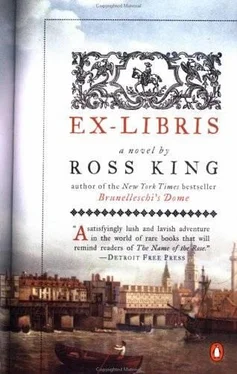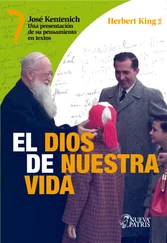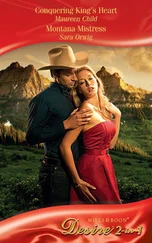I replaced my spectacles and for a moment said nothing. Alethea had remained silent, awaiting my reply. Well… what did I really have to lose? It was possible I wouldn't be required to travel after all. I had all of my factors, of course: good men in Oxford, Paris, Amsterdam, Frankfurt. And Monk could be counted on to scour the bookstalls in Paternoster Row and Westminster Hall, or anywhere else I might see fit to send him. And for all I knew the book might even be on my walnut shelves at this very minute. Well? Stranger things did happen. After all, I knew for a fact that I had a copy on my shelves of Sir Walter Raleigh's Discoverie of the large, rich, and beautifull Empire of Guiana -a fifth title that I had made out on the upside-down page a minute earlier.
I turned round to face her. Almost despite myself I extended my hand.
'Well? What, may I ask, is the name of this valuable book?'
***
That afternoon I was slumped back in the seat of the carriage for the return journey to London. For the first time in hours-in days -I felt myself relax. Phineas cracked his whip, the horses plunged forward, the stunted trees flew past the quarter-lights. But then as we approached the archway we came within inches of colliding with a lone horseman riding full pelt towards the house.
'Sir Richard!'
'Bloody old fool! Out of my path!'
' Yes , Sir Richard!'
Phineas jerked the reins violently sideways. The carriage lurched towards the grassy verge, where the right front wheel jarred over a rock and then slipped into a trench. I was flung forward on to the floor of the box, twisting my hip. The rider spurred his mount, a big chestnut roan, and flew past my window with a rook-like caw.
By the time I righted myself we had climbed out of the trench and were passing beneath the archway. Grimacing, I twisted round in the seat and raised the leather flap on the tiny oval rear-window. I watched the rider dismount and then bow before Alethea, who curtsied and offered her hand. She had already changed into a riding-habit in expectation of his arrival. Her visitor was a big fellow in an old-fashioned millstone ruff and a high-crowned hat with a purple ribbon that twitched in the breeze. They were framed for a second by the wings of Pontifex Hall, two figures in an oil painting. Then we turned a corner and the painting was riven by a length of broken wall and unkempt hedgerow.
'Sir Richard Overstreet,' shouted Phineas, for once volunteering some information. 'A neighbour. Betrothed to marry Lady Marchamont.'
'Is that so?'
'Before the year is out, I shouldn't wonder. A scoundrel, sir, if you ask me,' he finished with uncharacteristic passion.
'Oh?'
But Phineas had said his piece. There were to be no further divulgations. We rode on, for three more days, in gloomy silence.
But the incident left a strange effect on me. My anger and impatience had drained away to be replaced by something else. For at some point during the previous day a small breach had been prised open. Certain images of Alethea filtered back along the irregular sluices of memory. As I closed my eyes these trickling channels carried past me images of her bent over the volumes, blowing dust from their bindings or tracing her fingertips across their surfaces like someone exploring the curve of a lover's face. Once she had even raised one of the books to her lips and, closing her eyes, sniffed at it as one would at a rose.
And so as the road twisted before us and untwisted behind I felt the first twinges of a confusing and unexpected distemper, the timid quivering of a stunted and vestigial organ for which, as with an appendix, I no longer had a use; something that, like a tail-bone or wisdom tooth, had been carried over from an extinct life, quiescent and forgotten. All at once I remembered how she looked at me in the crypt, as well as the dozens of books on sorcery crammed on to the shelves of the library, and for a moment I wondered if during my stay she might not have magicked me like a witch or a wisewoman-if some heathen spell was the source of these strange quavers. But before I could contemplate this foolish notion any longer, the leaky flood-hatches had been closed by the pain in my hip. Still, the event was no less worrying for its brevity. I would remain on the alert for further symptoms.
As my seat tipped back and forth I watched the combes open and dip, the hills and trees rise to meet us, then fall away. A few clouds hung overhead, grey as gun-smoke. Again I felt myself relax. Soon I would see the golden cupolas and brass weathercocks of Nonsuch House rising into the smoke-filled London sky. Soon I would be back inside my thick walls of books, sealed off from the alarming conundrums of the world. The events of the past day would seem nothing but a strange dream from which I had gratefully awakened, unsure of where I had travelled or what might have transpired.
But I would still possess a memento of my journey, a garbled testament of its strange purpose. As we reached Crampton Magna I withdrew a piece of paper from my pocket and stared hard at the smudged words inscribed in Alethea's old-fashioned secretary hand: Labyrinthus mundi , or The Labyrinth of the World .
Rattling about in my seat, I frowned at the paper as I had when Alethea first placed it into my hands. The name sounded vaguely familiar, though I was far from certain where I might have heard of it. It was the name of a work quite different from the other errant volumes, those treatises on navigation and remote explorations of the Spanish Americas. It was a parchment that dated, she claimed, from early in the fifteenth century, when it had been copied from a papyrus original-now lost-and translated into Latin by a scribe in Constantinople: a fragment of perhaps ten or twelve vellum leaves in the ornate oriental blind-tooled binding known as rebesque or arabesco . She would say nothing more except that it was a Hermetic text, an obscure one that had never been published. But how such a parchment could be worth two hundred pounds, and how it had become the mysterious index of Lady Marchamont's fortunes, such riddles I did not wish, at this point, to consider.
How much did I know, at that time, about the so-called Corpus hermeticum? No more, I suppose, than anyone else. I was aware, naturally, of how the manuscripts first appeared in Florence some two hundred years ago, after Cosimo de' Medici sent forth bands of his agents with orders to bring back to his magnificent library whatever parchments they could lay their hands on in every church and monastery that would let them past their doors. And I knew how these explorers-mostly monks from the San Marco in Florence-had recovered scores of lost masterpieces in the fusty libraries and scriptoria of the far-flung monasteries of Monte Cassino, Langres, Corvey and St. Gall, works by such esteemed authors as Cicero, Seneca, Livy and Quintilian, and dozens more besides, all of which were quickly edited, translated and placed for study and safekeeping with the other treasures in the Medici Library. The thought of these scholar-explorers, these intrepid friars on muleback, I had always found appealing. Theirs were the humblest and yet most noble voyages of discovery, dangerous trips made decades before the sailing of Columbus and Cabot, before the mania for navigating the world took over, perilous journeys whose object was not gold or spices or trade routes but ancient manuscripts, a few dried-out animal skins whose secret worlds were brought back to life only after weeks of plodding along overgrown, bandit-infested mountain tracks.
And I knew, finally, how the greatest of all these discoveries was made in or about the year 1460, less than ten years after the fall of Constantinople to the Turks, when one of Cosimo's fearless monks brought back to Florence the first fourteen books of the Corpus hermeticum . The treasure uncovered in Macedonia was as valuable-or so Cosimo believed-as the spices of India or the gold of Peru, and worth all of the other manuscripts in the Medici Library combined. The parchments reached Florence soon after the untranslated dialogues of Plato, which had been brought out of Macedonia by Giovanni Aurispa. But Cosimo ordered Marsilio Ficino, the greatest scholar in Florence, and therefore the greatest scholar in the entire world, to translate the works of Hermes first, because he believed, like everyone else, the great Ficino included, that Plato had received all of his wisdom from none other than the ancient Egyptian priest Hermes Trismegistus. For, after all, had not ancient scholars like Iamblichus of Apamea described how Plato drank down the revered knowledge of Hermes Trismegistus while visiting Egypt? So why should Cosimo read copies by this upstart Plato if he owned their originals, the works of Hermes Trismegistus himself?
Читать дальше












